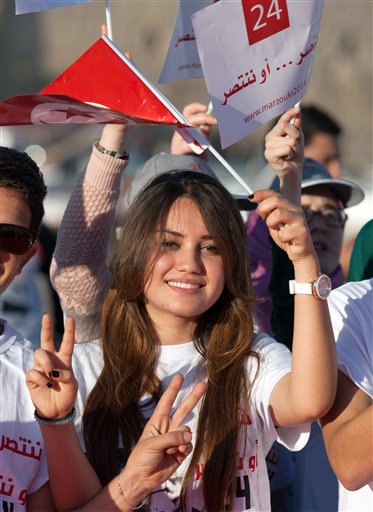TUNIS, Tunisia (AP) — Tunisia’s first free presidential election is boiling down to two candidates with divergent views of the revolution that transformed this former dictatorship.
The clear front-runner in Sunday’s ballot is veteran politician Beji Caid Essebsi, who has been campaigning for the restoration of the state’s prestige in the face of the chaos that followed the 2011 overthrow of dictator Zine El Abidine Ben Ali.
Among two dozen other candidates, the one most likely to make it into a runoff with Essebsi is incumbent interim president Moncef Marzouki, a veteran rights activist who was once imprisoned by the old regime and is a symbol of the revolution.
Tunisia’s presidential election represents the final phase in a torturous and difficult transition to democracy since Tunisians overthrew Ben Ali in January 2011 — sparking the Arab Spring protests that ousted autocrats across the Middle East. Tunisia’s post-dictatorship era has been marked by social unrest, terrorist attacks and political wrangling.
However, Tunisia is also alone among the Arab Spring countries to keep its democratic transition on track, and the often intransigent political parties have always found a way to reach consensus.
In January 2014, the Islamist-dominated constitutional assembly, an elected body, passed a new constitution described as the most progressive in the Arab world, paving the way for legislative elections in October that resulted in a victory for opposition secular parties.
While political disputes have been settled by rival militias in neighboring Libya or a military overthrow of the government in Egypt, Tunisia’s politicians have managed to keep their arguments within the framework of the political process.
Tunisia’s new president will serve for five years and manage defense and foreign affairs. With neither Essebi nor Marzouki polling near the 50 percent needed to win outright, the contest is likely go to a runoff set for Dec. 28.
Essebi, who turns 88 next week, has about 32 percent support in the most recent polls. He draws his appeal from alarm over the disorder that has reigned since the revolution, and fear the Islamists may roll back the country’s progressive heritage in education and women’s rights.
Staying on the sidelines is the powerful moderate Islamist Ennahda Party which has refused to run or endorse a candidate “to avoid deepening polarization or dividing the country,” accord to a recent statement by leader Rachid Ghannouchi.
The statement also noted the “increase in zeal and rivalry which has in some cases led to the hostile discourse, verbal attacks and fear-mongering.”
Supporters of Essebsi and his party Nida Tunis — Tunisia’s Call — claim that those backing Marzouki have resorted to attacks and thuggery.
One candidate, former central bank governor Mustapha Kamel Nabli, quit the race denouncing a “climate of violence and terror” after attacks on his campaign bus which he linked to Marzouki supporters.
Meanwhile, Marzouki, a secularist who also enjoys support from Islamists, has been warning against the return of the former regime in the form of Essebsi — who served in the government of Ben Ali and Tunisia’s other post-independence president, Habib Bourguiba. He calls former officials of the dictatorship “taghout” or oppressors.
Marzouki has been playing on fears that an Essebsi victory could augur a return of the one-party state, since his party took the largest number of seats — nearly 38 percent — in parliament after October’s election.
Nida Tunis also includes many members of Ben Ali’s old ruling party and has revived their patronage networks in the countryside to gain votes.
A possible dark horse for the runoff is Hamma Hammami, the leader of the left-wing Popular Front coalition. The movement is popular in the poorer south and is one of the only ones addressing the plight of Tunisia’s poor, who have been battered by soaring inflation of around 6 percent.
“If the next government does not in the first few weeks take urgent measures to address this problem,” Hammami said recently, “there risks being a social explosion in the country.”
___
Associated Press writer Paul Schemm contributed from Rabat, Morocco.

COMMENTS
Please let us know if you're having issues with commenting.